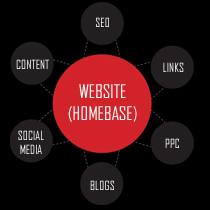So just how does internet marketing work after all? All this talk about links and SEO and content strategy, it can be very confusing! Well help is here. This article explores the basics of how internet marketing works. It provides a 30,000 foot aerial view of the process so you can decide if it’s the right choice for you.
Conventional vs. Internet Marketing
Conventional marketing interrupts your target audience. Just think of how television, radio, and print ads work. They interrupt the user’s media experience with an unwanted marketing message. True, people have been getting better at making ads more enjoyable so that less people grab a snack from the fridge – but internet marketing is an entirely different animal.
Internet marketing is completely inbound. People are looking for your solution when they search online. They want relevant information on what they are searching for. They have invited the salesmen to their door.
What Are Home bases and Outposts?
The difference between a Home base and an Outpost is that a Home base is a piece of web property you actually own, whereas an Outpost is one that you do not. The only real Home base you need to concern yourself with is your central WordPress website. This will be parked at a domain you own, for example www.mysite.com. In addition to your Home base you’ll have Outposts. These are built on web properties you do not own.
Some popular examples of Outposts include your brand’s:
- Facebook Page
- Twitter account
- LinkedIn profile
- YouTube Channel
The goal is to use your Outposts to pull visitors in towards your Home base. Once they arrive at your Home base, the engagement process can begin. But before we get ahead of ourselves, just how exactly do you get people to visit your site?
Internet Marketing Content Strategy
Your Home base needs lots of content that is transmitted out to your Outposts regularly. You’ll need to frequently create content that your visitors care about. These content items can take many forms, such as:
- Blog posts
- Videos
- Podcasts
- Images
- Infographics
For help with coming up with content, you should check out the Complete Guide to Writing a Blog Post series. It’s full of ideas and tips that are useful for coming up with great blog post ideas. Even more, the techniques taught can also be adapted for thinking about all sorts of different content items, like your next video post.
Now that you’re making useful and unique pieces of content on a regular basis, you want to push this content out to your Outposts. For example, you may have come to this blog post after seeing an announcement on Facebook or Twitter. Let the different online communities you participate in know when you release a new piece of content. You’ll be surprised how many people will head on over to your site as a result.
Get Users to Subscribe
Sure, it’s great when people just happen to see your latest Facebook update or Twitter announcement about a new piece of content. But what you really want are subscribers! A subscriber to your Home base will receive an email, RSS, or newsletter update (better yet offer all three) every time you release a new piece of content. This guarantees that the person is informed of your new content, rather than just hoping they stumble upon an update seen on an Outpost. You get (and keep) subscribers by creating useful and unique content.
Much like magazines, you have to create good content to get someone to sign up for the next issue. But once they do sign up, you pretty much have them forever, and can continue to engage with them indefinitely. This is called building an online community or an audience.
Rank High on Search Engines
OK, undoubtedly everyone’s favorite. Ranking high on search engines is everybody’s ultimate goal. Why? If we go back to the beginning of the article, you’ll remember that people online are already searching for your solution. Someone searching for “Pittsburgh Landscapers” is probably looking to hire one. Well, they better be able to find you at the top of a search results page. That’s where SEO comes in.
So you may be asking, “but what about all this stuff you just said about writing frequent content and getting subscribers? Does that even really matter? I mean as long as I rank high who cares? My customers are too old to read blog posts anyway. They don’t use Facebook either.” And on and on…
Content Is Still King
Even if your customers don’t look at your content, it’s still critical to have it there anyways. This is because search engines prefer sites that are frequently updated. And this makes common sense too! The goal of a search engine is to rank the most relevant sites related to a searcher’s inquiry the highest. And which site do you think will rank higher? The one that hasn’t been updated since 2003? Or the one that’s had consistent blog posts every month? The search engine will rank the one with the frequent content higher because it believes (rightly so) that the regularly updated site is better maintained and therefore of higher relevance and quality to the searcher.
Not only that, but building and sustaining relationships with your visitors is just a good idea. Your competitors will be doing it. So should you.
Onsite SEO
“OK, OK I’ll make content already sheesh…”
Good! Now that you’re making content regularly, the next step is to make various tweaks to the keywords used on your site. Onsite SEO is the process of configuring title tags, meta data, and other areas of your website in order to maximize your rankings for the most competitive and profitable keywords related to your business. This is usually done through using an HTML editor like Dreamweaver or a WordPress plugin like the All in One SEO Pack.
The technical part isn’t so hard. What is hard is figuring out which keywords to actually target. That just takes keyword research and some brand soul searching. You’re looking for keywords that get a lot of searches each month, but are not so generic or popular that it’s ultra competitive and impossible to rank high for.
Offsite SEO
“I did my onsite SEO perfectly and I’m still on page 18 of Google!”
Well that’s because everyone else you’re competing with also did their onsite SEO perfectly too. Now comes the long, bloody battle of offsite SEO. In a nutshell, offsite SEO is a blanket term that covers a number of strategies designed to build links on other sites that point to your Home base.
Why is this important? Because a Home base with lots of links pointing to it tells the search engines that other people think your site is important, relevant, and of high quality. A site with no links (or all poor quality links) will be viewed by a search engine as irrelevant to the overall keyword community in which your site is competing in.
It makes sense too. Just think if the New York Times links to your article on “Ten Tips for a Better Lawn this Year”, Google will certainly rank your article higher than someone without such a high quality link. The New York Times has essentially vouched for the quality and relevance of your site – and Google will rank you higher accordingly.
How Do I Get Links?
Getting links to point back to your site is a process known as Link Building. There are a number of ways to get links:
- Create really, really, really great blog posts, or videos, or other pieces of content, that people naturally will want to share and link back to because they are just so great (called Link Baiting).
- Offer to write an article on another person’s blog (known as Guest Posting) in exchange for your placing a link in the article that points back to your Home base. You’d be surprised at how often people are willing to give you a link on their site in exchange for helping them write so more content.
- Submit your site to online directories, such as the DMOZ. Most people today say this doesn’t matter very much anymore, but it can’t hurt to do it anyways. There are literally hundreds, sometimes thousands, of niche directories you can submit your site too.
Link Building is a time and resource consuming process. You’ll need people writing guest posts, submitting to directories, etc. etc. etc. That, plus you’re also trying to publish frequent content! It can all get very overwhelming. That’s where E3 comes in. We provide these services as a subcontractor so you can focus on your business. We offer Monthly SEO Packages designed to fit every budget. But you should definitely check out our internet marketing blog first and give this whole SEO thing a shot yourself!
I Need Website Visitors Quick
In that case you’ll want to consider Pay Per Click (PPC) advertisements. These are the paid ads you see in the results pages of search engines like Google, Yahoo, and Bing. There are also PPC ads available for social media sites like Facebook, although their click through rates are poor and the cost is high.
I recommend your PPC advertising budget be focused solely on the Google or Bing search engines. It is important to do your research on how to write and target your PPC ads effectively, otherwise you’ll waste most of your budget targeting people uninterested in your ad. And this can get VERY costly with little to show for it! More on this to come in a future article.



This is like a beginner’s course for internet marketing. It’s perfect for me. I’m really glad I was able to visit your site and got to read this article.
Hi there to every body, it’s my first go to see of this website; this webpage includes awesome and genuinely good stuff in support of visitors.
Excellent way of describing, and good post to obtain facts about my presentation focus, which i am going to present in institution of higher education.
Great post…looking forward to spreading this one around a little. Thanks for summing up online efforts so succinctly. The I-stock pix were pretty fun – much better than your previous use of sausage fixings.
Excellent post. Online marketing has become a part of every business. Everybody wants to get more and more business with the help of internet.
Owoo! Nice Topics. It is helpful to everybody who wants to make SEO for his site.
When you have a website, you have to use Internet marketing for it. Google adwords or SEO is solution you think about this.
Hiya! I just want to give an enormous thumbs up for the nice info
you could have right here on this post. I will probably be coming
back to your weblog for more soon.